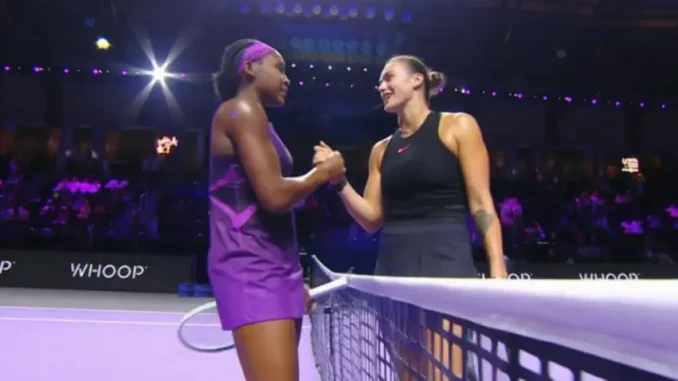
In the electric atmosphere of Madrid’s Caja Magica, Aryna Sabalenka, the world No. 1, delivered a masterclass in strategic tennis to claim her third Madrid Open title on May 3, 2025, defeating Coco Gauff 6-3, 7-6(3). The final, a thrilling clash between two of the WTA’s brightest stars, showcased Sabalenka’s evolving game plan, meticulously dissected by former WTA pro and analyst Pam Shriver. “The whole training is based on adding layers to her power,” Shriver noted, highlighting how Sabalenka’s blend of aggression, variety, and mental resilience outmaneuvered Gauff’s defensive prowess. This victory, Sabalenka’s 20th career title, solidified her dominance and offered a blueprint for her clay court supremacy as the French Open looms.
Sabalenka’s strategy was rooted in her signature power but elevated by newfound finesse. From the outset, she unleashed a barrage of groundstrokes, winning 17 consecutive points to surge to a 4-1 lead in the first set. Her serve, landing 69% of first serves with a 68% win rate, was a cornerstone, allowing her to dictate rallies. “I found my rhythm on the serve and then I was just trying to put as much pressure on her serve as possible,” Sabalenka said post-match, reflecting on her ability to exploit Gauff’s second serve, which yielded only 53% of points. Shriver emphasized this tactical choice, noting, “Aryna’s training has focused on punishing second serves, especially on clay where she can step in and take control.” Sabalenka’s forehand, often a weapon, was clinical, though she faced brief “deceleration issues” that allowed Gauff to claw back to 4-2.
The Belarusian’s evolution was evident in her use of variety—a departure from her traditional reliance on brute force. Incorporating drop shots and net play, SabalenV2, Sabalenka carved exquisite drop shots to open the match, a tactic Shriver praised: “Her training now includes these subtle additions, like coming to net more often, which is paying off on clay.” A surprise serve-and-volley in the first set caught Gauff off-guard, showcasing Sabalenka’s growing confidence in her touch game. “I’ve been working really hard and improving my game on bringing variety,” Sabalenka said, crediting her team, including coach Anton Dubrov and biomechanic specialist Gavin MacMillan, for refining her approach. This adaptability was crucial against Gauff, whose elite defense—described by Shriver as “making the court seem narrow”—demanded more than just power.
Gauff, the world No. 4, fought valiantly, leveraging her athleticism and backhand to counter Sabalenka’s aggression. Fresh off a 6-1, 6-1 semifinal rout of Iga Swiatek, Gauff entered with confidence, leading their head-to-head 5-4, including a 2021 Rome clay win. In Madrid, her forehand showed improvement, with Shriver noting, “Coco’s been training to take the ball earlier, adding heft to her shots.” She broke Sabalenka for a 2-1 lead in the second set and served for a decider at 5-4, earning a set point. But Sabalenka’s mental fortitude shone through. “I’m super happy that I was able to handle my emotions at the end of the second set,” she said, laughing off a moment when her racquet slipped mid-rally. She broke back, saving six break points, and dominated the tiebreak, capitalizing on Gauff’s eighth double fault to seal the match.
The final was a microcosm of their rivalry, now level at 5-5. Gauff’s 29 winners to Sabalenka’s 25 showed her aggression, but her 28 unforced errors, compared to Sabalenka’s 21, proved costly. “I’m gutted for Coco because she was marginally the better player for a chunk of the second set,” analyst Colin Fleming said, pointing to her three double faults at 5-4 as a turning point. Gauff remained gracious: “I’d like to congratulate Aryna on an incredible tournament. You’re always tough to face.” Sabalenka reciprocated, saying, “I always enjoy fighting against you, you’re such a fighter.”
Sabalenka’s Madrid triumph, her ninth WTA 1000 title, cements her as the tour’s match-win leader with 31 victories in 2025. Her training, as Shriver decoded, balances power with precision, preparing her for Rome and Roland Garros, where she’s yet to conquer. For Gauff, the loss stings, but her run signals a clay court resurgence. As Sabalenka lifts her trophy, equaling Petra Kvitova’s three Madrid titles, her words echo: “I just love this court, I love the support here.” For fans, this final was a glimpse into tennis’s future, where strategy and heart collide.
Leave a Reply